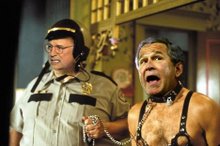Is Hillier out of line?
Feb 20, 2007 04:30 AM
Michael Byers
Chief of defence is playing a highly unusual public role in promoting the mission in Afghanistan, even bypassing the defence minister to deal directly with the Prime Minister
Canada's mission in Afghanistan is failing and Chief of Defence Staff Rick Hillier deserves much of the blame.
Since becoming Canada's top soldier two years ago, Hillier has pushed the politicians hard. At his own swearing-in ceremony, he criticized Paul Martin for underfunding the military; one month later, he browbeat the Liberal cabinet into volunteering troops for a combat mission to Kandahar.
Then-prime minister Martin and his ministers assumed Canadian casualties would be limited. So far, 44 soldiers have lost their lives. Hillier, the professional upon whose expertise the politicians relied, should have explained the real risks to them.
The Martin government also assumed Canada would contribute to the combat mission for a limited time only. But Hillier changed his tune shortly after Stephen Harper was elected: "From NATO's perspective, they look at this as a 10-year mission, right? Minimum. There's going to be a huge demand for Canada to contribute over the longer period of time."
Hillier promised Martin that the combat mission would not preclude Canadian participation in UN peacekeeping missions elsewhere. He's since broken that promise, ruling out troops for Lebanon and Darfur on the basis that Canada is fully committed in Afghanistan.
We're experiencing a serious case of "mission creep."
Under Hillier's leadership, Canada's role in Kandahar has morphed from a "provincial reconstruction team" made up of soldiers, diplomats and development personnel, into a "battle group" supported by Leopard tanks.
Hillier has also used language that may have placed ordinary Canadians at greater risk. Foiled terrorist plots in Toronto and London were reportedly motivated, at least in part, by anger at the presence of Western troops in Afghanistan.
Characterizing the enemy as "detestable murderers and scumbags" can only exacerbate the situation. It also makes the jobs of diplomats and politicians more difficult, as they search for the inevitable, negotiated peace.
Hillier has even compromised this country's commitment to international law.
In December 2005, he usurped the role of the Canadian ambassador by signing a detainee-transfer agreement with the Afghan defence minister.
The agreement provided only the most rudimentary protections for prisoners, despite the fact that Britain, Denmark and the Netherlands had already concluded much more rigorous transfer agreements – copies of which were available to Hillier as models of "best practice."
Some of the consequences of this were visible recently.
After evidence emerged of possible beatings in Canadian custody, the Canadian Forces were forced to admit they had no idea what had happened to the more than 50 prisoners transferred to Afghan or U.S. custody since 2002.
On the whole, Hillier has been content to adopt the approach of the Bush administration, emphasizing aggressive search-and-kill tactics and downplaying diplomacy, development, and international law.
It's an approach that's already failed in Iraq, leading to the resignation of U.S. defence secretary Donald Rumsfeld.
It's failing in southern Afghanistan, too. After five years, the region has become more, rather than less, dangerous.
The Taliban is recruiting new fighters, opium production has skyrocketed, and the plight of ordinary people has not improved – if measured by their security from violence and access to food, medicine and other basic services. Kabul, the capital of Afghanistan, still doesn't have a reliable electricity supply.
A new approach is clearly needed, one that focuses on effective and transparent development assistance, the training and ongoing support of a well-paid and professional Afghan police force, and dialogue and diplomacy with at least some of the groups we're fighting against.
Twenty-one out of 26 NATO countries realize this, which is why Canada has been carrying so much of the combat load, and suffering 25 per cent of the casualties.
Hillier shares the dubious company of U.S. President George W. Bush and British Prime Minister Tony Blair in stubbornly refusing to admit his mistake.
In 1951, U.S. general Douglas MacArthur violated the principle of civilian control over foreign and defence policy, first by speaking directly to the media about the overall direction of the Korean War, and then by issuing an ultimatum to China. President Harry S. Truman promptly relieved MacArthur of his command.
Hillier is demonstrating similar tendencies. In addition to signing the detainee-transfer agreement, he's dominated Gordon O'Connor, keeping important information from the defence minister – such as the fact that Canada had acquired a number of Excalibur artillery shells costing $150,000 apiece – and bypassing him to deal directly with the Prime Minister. He's played a highly unusual public role in promoting the mission, and has even used wounded soldiers as part of an elaborate cross-Canada PR campaign.
On Friday, Hillier, who claims to be non-partisan, called the Liberal cutbacks of the 1990s a "decade of darkness" for the military.
Last week, the Senate Defence Committee asked: "Are Canadians willing to commit themselves to decades of involvement in Afghanistan, which could cost hundreds of Canadian lives and billions of dollars, with no guarantee of ending up with anything like the kind of society that makes sense to us?"
With spring arriving in Afghanistan, the risk to Canada's soldiers is about to escalate. How many more of them must die before Hillier is called to account?
Michael Byers hold the Canada Research Chair in Global Politics and International Law at the University of British Columbia. His new book, Intent for a Nation, will be published in May.
Michael Byers
